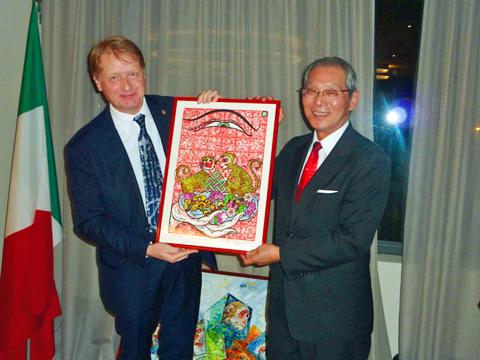The resignation request of Representative to the US Shen Lyu-shun (沈呂巡) prompted President Tsai Ing-wen (蔡英文) to make her first foreign affairs personnel assignment after her inauguration on Friday, with Representative to Italy Stanley Kao (高碩泰) reportedly having been tapped by the new government as the next representative to the US.
Tsai’s government will have to name representatives to the nation’s various overseas missions following a slew of resignations, which ostensibly occurred to allow the new administration greater latitude in its appointments.
Then-outgoing president Ma Ying-jeou (馬英九) approved the resignations of Representative to the UK Liu Chi-kung (劉志攻) on May 6; Representative to Japan Shen Ssu-tsun (沈斯淳) on Monday last week; and Representative to Singapore Jacob Chang (張大同) and Representative to Latvia Gary Ko (葛光越) on Thursday.

Photo: CNA, provided by Taipei Representative Office in Italy
While Shen Lyu-shun had tendered his resignation on April 15 and applied for retirement, his resignation was not approved by Ma.
The Ministry of Foreign Affairs said it has forwarded the new administration’s request that Shen Lyu-shun make plans to return by next month to facilitate the transition to a new representative to the US.
Aside from Kao, it has been rumored that former premier Frank Hsieh (謝長廷) is to be the new representative to Japan, while former minister of foreign affairs David Lin (林永樂) has been rumored to be the nation’s next representative to the UK.
The ministry said the list of representatives for the aforementioned countries has not yet been confirmed, adding that the new government would also have to designate a new representative to Australia, as Representative to Australia David Lee (李大維) has been appointed to be the new Minister of Foreign Affairs.

SECURITY: As China is ‘reshaping’ Hong Kong’s population, Taiwan must raise the eligibility threshold for applications from Hong Kongers, Chiu Chui-cheng said When Hong Kong and Macau citizens apply for residency in Taiwan, it would be under a new category that includes a “national security observation period,” Mainland Affairs Council (MAC) Minister Chiu Chui-cheng (邱垂正) said yesterday. President William Lai (賴清德) on March 13 announced 17 strategies to counter China’s aggression toward Taiwan, including incorporating national security considerations into the review process for residency applications from Hong Kong and Macau citizens. The situation in Hong Kong is constantly changing, Chiu said to media yesterday on the sidelines of the Taipei Technology Run hosted by the Taipei Neihu Technology Park Development Association. With

CARROT AND STICK: While unrelenting in its military threats, China attracted nearly 40,000 Taiwanese to over 400 business events last year Nearly 40,000 Taiwanese last year joined industry events in China, such as conferences and trade fairs, supported by the Chinese government, a study showed yesterday, as Beijing ramps up a charm offensive toward Taipei alongside military pressure. China has long taken a carrot-and-stick approach to Taiwan, threatening it with the prospect of military action while reaching out to those it believes are amenable to Beijing’s point of view. Taiwanese security officials are wary of what they see as Beijing’s influence campaigns to sway public opinion after Taipei and Beijing gradually resumed travel links halted by the COVID-19 pandemic, but the scale of

A US Marine Corps regiment equipped with Naval Strike Missiles (NSM) is set to participate in the upcoming Balikatan 25 exercise in the Luzon Strait, marking the system’s first-ever deployment in the Philippines. US and Philippine officials have separately confirmed that the Navy Marine Expeditionary Ship Interdiction System (NMESIS) — the mobile launch platform for the Naval Strike Missile — would take part in the joint exercise. The missiles are being deployed to “a strategic first island chain chokepoint” in the waters between Taiwan proper and the Philippines, US-based Naval News reported. “The Luzon Strait and Bashi Channel represent a critical access

Pope Francis is be laid to rest on Saturday after lying in state for three days in St Peter’s Basilica, where the faithful are expected to flock to pay their respects to history’s first Latin American pontiff. The cardinals met yesterday in the Vatican’s synod hall to chart the next steps before a conclave begins to choose Francis’ successor, as condolences poured in from around the world. According to current norms, the conclave must begin between May 5 and 10. The cardinals set the funeral for Saturday at 10am in St Peter’s Square, to be celebrated by the dean of the College